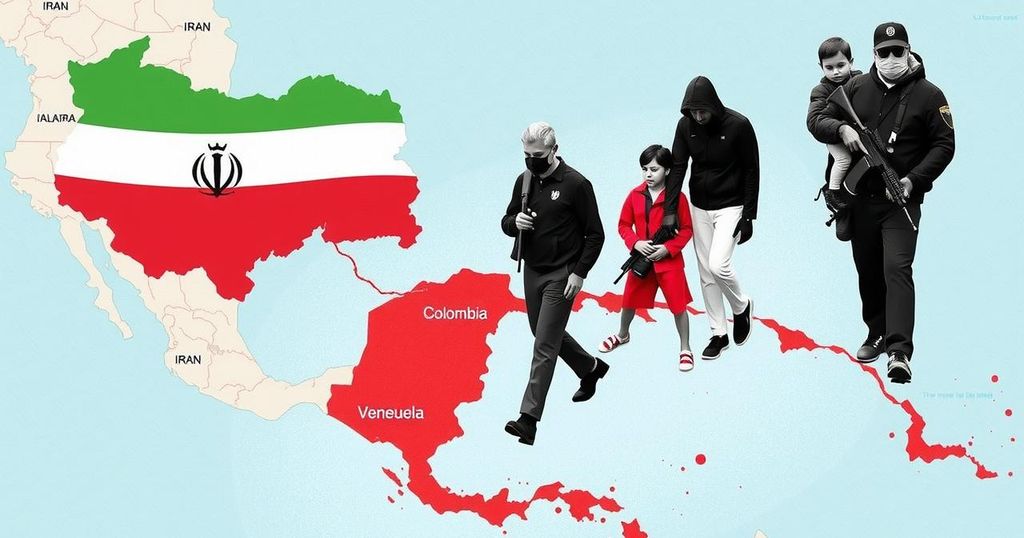The recent increase of Iranian nationals entering Colombia through falsified documents has raised alarms regarding Iran’s growing influence in Latin America. This development coincides with the controversial re-election of Venezuelan President Nicolás Maduro, and highlights enhanced cooperation between Iran and Venezuela amidst assertions of deepening bilateral ties and troubling military partnerships, complicating the regional security landscape.
In recent weeks, the significant arrival of Iranian nationals with allegedly falsified passports in Colombia has sparked considerable concern among Latin American security officials and Western diplomats regarding Iran’s escalating influence in the region. This development unfolded parallel to the contentious re-election festivities of Venezuelan President Nicolás Maduro, where Iranian supporters were visibly celebrated on state television. During his speech, Maduro proclaimed, “Long live the Islamic Republic of Iran,” thus highlighting a deliberate effort to strengthen ties with Tehran.
Iran’s Foreign Ministry Spokesman Esmail Baghaei expressed public support for Maduro, promising increased cooperation against what he termed the “evil interventions and unilateral and illegal US sanctions.” This alignment of Iran with Russia, Cuba, and Nicaragua, who are all significant supporters of Maduro, takes place as Venezuela faces growing isolation internationally, particularly following the disputed elections last July characterized by widespread allegations of fraud.
Moreover, the return of Colombian businessman Alex Saab—who has strong ties to the Maduro administration—after his release in a prisoner swap in December 2023 has further accelerated the collaboration between Caracas and Tehran. Saab now holds the position of Minister of Industry, becoming pivotal in strengthening economic and strategic relationships between the two nations. Colombian migration authorities have noted a concerning trend of Iranian citizens using counterfeit documentation to transit through the country, indicating a possible coordinated operational effort, implying state involvement.
Reports have also surfaced regarding the lengthy military cooperation between Venezuela and Iran, including a joint drone development program producing surveillance and combat drones. Particularly troubling for Western security agencies is the emergence of Hezbollah operational centers in Venezuela, operating through familial clan structures that are integrated into the regime-controlled illicit economy. As foreign policy expert Joseph M. Humire noted, Hezbollah’s support network in Venezuela intertwines deeply with the state and societal framework.
Reports suggest that Venezuelan nationals are receiving training locally before progressing to specialized combat courses in Iran. The economic arrangement between the two nations has also come under scrutiny, with Iranian carrier Mahan Air operating sanctioned flights facilitating a gold-for-oil trade, effectively circumventing international sanctions. November 2022 marked a significant moment when Iran and Venezuela signed 289 bilateral agreements across varying sectors, indicating the solidification of ties since Hugo Chávez’s administration.
Iran’s ambassador to Caracas, Hojat Soltani, has reportedly intensified cooperation in key sectors, modeling the relationship on the shared objectives of both nations. The charges against former Oil Minister Tarek El Aissami further emphasize the infiltration of Iranian and Hezbollah influence into Venezuela, with allegations involving drug trafficking and arms trade. His eventual arrest following an extensive period of evading authorities underscores the critical state of governance in Venezuela and poses ongoing challenges for regional stability.
The strengthening nexus between Caracas and Tehran ultimately represents a multi-layered concern for regional security experts and Western policymakers, who now face the intricate challenge of managing stability in Latin America amidst the growing influence of Russia and China.
The article explores the increasing Iranian presence in Venezuela and the alarming implications for regional and international security. It details how the ongoing ties between the two nations have been bolstered by shared ideological affiliations and economic exchanges, especially amidst accusations of political fraud and international isolation faced by Maduro’s administration. The dynamics of Iranian migration patterns, military cooperation, and affiliations with groups like Hezbollah present a complex security landscape for Latin America and beyond.
In summary, the burgeoning alliance between Venezuela and Iran signifies significant regional concerns, particularly in terms of security and international relations. The coordinated efforts involving Iranian nationals, military cooperation, and the entrenchment of groups such as Hezbollah illustrate the complexities and challenges faced by Western policymakers. As these two nations deepen their connections, preserving stability in Latin America remains a growing imperative for regional and global security efforts.
Original Source: www.intellinews.com






